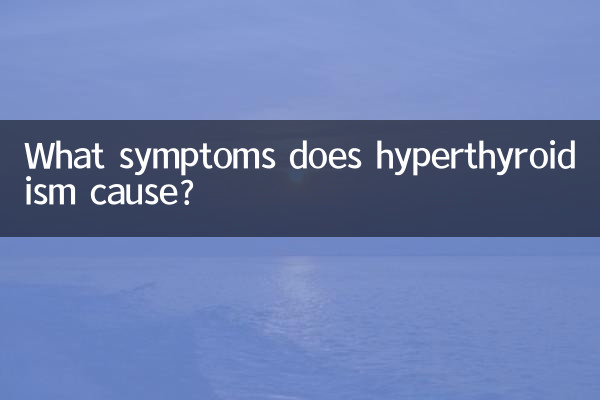What symptoms does hyperthyroidism cause?
Hyperthyroidism (hyperthyroidism for short) is a common endocrine disease. Excessive secretion of thyroid hormone leads to hypermetabolism and sympathetic nervous system excitement. The symptoms of hyperthyroidism are diverse and may involve multiple systems, seriously affecting the patient's daily life. This article will combine the hot topics and hot content on the Internet in the past 10 days to give you a detailed introduction to the symptoms that may be caused by hyperthyroidism, and help you better understand it through structured data.
1. Common symptoms of hyperthyroidism

The symptoms of hyperthyroidism vary from person to person, but here are some of the most common ones:
| Symptom classification | Specific performance |
|---|---|
| Hypermetabolism | Afraid of heat, sweating, increased appetite but weight loss |
| cardiovascular system | Palpitations, tachycardia, arrhythmia, elevated blood pressure |
| nervous system | Easily agitated, irritable, insomnia, hand tremors |
| digestive system | Diarrhea and increased stool frequency |
| Musculoskeletal | Muscle weakness, periodic paralysis |
| Eye symptoms | Protosis, eyelid edema, vision loss |
2. Special symptoms of hyperthyroidism
In addition to the common symptoms mentioned above, hyperthyroidism may also cause some special symptoms, which have attracted much attention in recent hot discussions:
| Special symptoms | Description |
|---|---|
| thyroid storm | The most serious complications of hyperthyroidism include high fever, sweating, tachycardia, irritability, delirium and even coma. |
| Thyroid heart disease | Long-term hyperthyroidism can lead to heart enlargement and heart failure |
| Pretibial myxedema | Non-pitting edema on the front of the calf |
| periodic paralysis | More common in Asian men, manifesting as sudden muscle weakness |
3. Gender differences in symptoms of hyperthyroidism
A hotly discussed topic on the Internet recently is the difference in symptoms of hyperthyroidism between male and female patients. Research shows that symptoms of hyperthyroidism may appear differently in different genders:
| gender | Common symptoms |
|---|---|
| women | Menstrual disorders, infertility, and greater mood swings |
| male | Sexual dysfunction, breast development, and periodic paralysis are more common |
4. Early warning signs of hyperthyroidism
According to recent discussions on health topics, the following symptoms may be early warning signs of hyperthyroidism and deserve special attention:
1. Weight loss without obvious reasons, especially when accompanied by increased appetite
2. Persistent palpitations or a feeling of rapid heartbeat
3. Obvious mood swings, irritability or anxiety
4. Slight tremor in hands
5. Swelling or pressure in the neck
5. Differentiation between hyperthyroidism and other diseases
Recently, there has been a heated discussion on medical forums about the similarities between the symptoms of hyperthyroidism and other diseases. The following table can help distinguish hyperthyroidism from some common diseases:
| similar diseases | Key points for identification |
|---|---|
| anxiety disorder | Hyperthyroidism has objective signs such as thyroid enlargement, exophthalmos, and weight loss. |
| diabetes | Patients with hyperthyroidism may have elevated blood sugar levels but do not have the typical symptoms of "three more and one less" |
| heart disease | Heart palpitations caused by hyperthyroidism are also obvious at rest and are accompanied by other symptoms of hyperthyroidism |
6. Management suggestions for symptoms of hyperthyroidism
Based on recent hot discussions on health topics, the following suggestions are made for the management of hyperthyroidism symptoms:
1. Seek medical attention promptly: Once suspected symptoms of hyperthyroidism occur, you should seek medical treatment as soon as possible.
2. Take medications regularly: Take antithyroid drugs as directed by your doctor, and do not stop taking them without authorization.
3. Lifestyle adjustments: avoid iodine-containing foods, quit smoking, and control caffeine intake
4. Psychological support: Patients with hyperthyroidism are prone to mood swings, and their families should provide understanding and support.
5. Regular review: monitor thyroid function and related indicators
Conclusion:
Hyperthyroidism is a treatable condition, but early recognition of symptoms is crucial. Through the structured data analysis of this article, I hope it can help everyone better understand the various manifestations of hyperthyroidism. If you or your family members develop the above symptoms, it is recommended to seek medical examination promptly to avoid delaying treatment. The recent hot topic of hyperthyroidism on the Internet also reminds us that paying attention to thyroid health is of great significance to the overall quality of life.

check the details

check the details